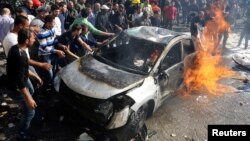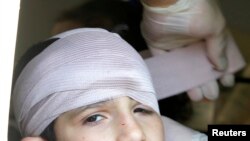Lebanese security officials said a twin suicide bombing hit the Hezbollah-controlled southern suburbs of Beirut on Wednesday during the morning rush hour, killing at least four people and wounding 70.
Wednesday morning’s blasts, which took place near an Iranian cultural center and the Kuwaiti embassy in a stronghold of the Shi'ite militant group Hezbollah, were caused by two suicide attackers, one in a car and the second on a motorcycle according to security sources. The same tactics were used by suicide bombers who attacked the Iranian embassy in November.
A militant group linked to al-Qaida, the Abdullah Azzam Brigades, claimed responsibility for the attacks on Twitter, saying the Iranian culture center was the target.
The windows of a nearby orphanage were blown out by the blasts. Children were peering out and screaming “bomb, bomb.” Some were crying. A man working at a sweet shop opposite the bomb site said the blast shook the entire area.
“We heard one explosion and then another,” he said.
Human remains were found nearby. The casualties included a number of children.
Radical Sunni Islamists sympathetic to the anti-Assad rebellion have pledged to attack Hezbollah on Lebanese soil for helping Assad, a member of the Alawite offshoot of Shi'ite Islam who is also backed by Shi'ite Islamist Iran.
Hezbollah blamed Saudi Arabia, a Sunni power that backs the Syrian opposition, for the November attack on the Iranian embassy, one of a series of car bomb attacks targeting Shi'ite areas in Beirut and eastern Lebanon.
Lebanese television showed video of charred and flaming cars at the blast site.
The Lebanese security forces last week arrested a man identified as the al-Qaida-linked mastermind of the recent string of car bomb attacks. The arrest of Naim Abbas was followed by a security sweep that resulted in the seizure of a number of cars rigged with explosives and ready to be deployed.
There have been a number of recent bombings in Lebanon, including a deadly blast earlier this month and two in January that hit Hezbollah-controlled sections of Beirut.
The war has also affected Lebanese politics, leading to paralysis in government. Prime Minister Tammam Salam on Saturday finally managed to form a government grouping rival parties after the country went 11 months without a cabinet.
Some information in this report contributed by Reuters.
Wednesday morning’s blasts, which took place near an Iranian cultural center and the Kuwaiti embassy in a stronghold of the Shi'ite militant group Hezbollah, were caused by two suicide attackers, one in a car and the second on a motorcycle according to security sources. The same tactics were used by suicide bombers who attacked the Iranian embassy in November.
A militant group linked to al-Qaida, the Abdullah Azzam Brigades, claimed responsibility for the attacks on Twitter, saying the Iranian culture center was the target.
The windows of a nearby orphanage were blown out by the blasts. Children were peering out and screaming “bomb, bomb.” Some were crying. A man working at a sweet shop opposite the bomb site said the blast shook the entire area.
“We heard one explosion and then another,” he said.
Human remains were found nearby. The casualties included a number of children.
Radical Sunni Islamists sympathetic to the anti-Assad rebellion have pledged to attack Hezbollah on Lebanese soil for helping Assad, a member of the Alawite offshoot of Shi'ite Islam who is also backed by Shi'ite Islamist Iran.
Hezbollah blamed Saudi Arabia, a Sunni power that backs the Syrian opposition, for the November attack on the Iranian embassy, one of a series of car bomb attacks targeting Shi'ite areas in Beirut and eastern Lebanon.
Lebanese television showed video of charred and flaming cars at the blast site.
The Lebanese security forces last week arrested a man identified as the al-Qaida-linked mastermind of the recent string of car bomb attacks. The arrest of Naim Abbas was followed by a security sweep that resulted in the seizure of a number of cars rigged with explosives and ready to be deployed.
There have been a number of recent bombings in Lebanon, including a deadly blast earlier this month and two in January that hit Hezbollah-controlled sections of Beirut.
The war has also affected Lebanese politics, leading to paralysis in government. Prime Minister Tammam Salam on Saturday finally managed to form a government grouping rival parties after the country went 11 months without a cabinet.
Some information in this report contributed by Reuters.






